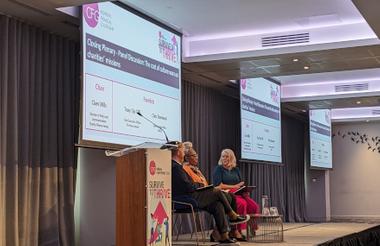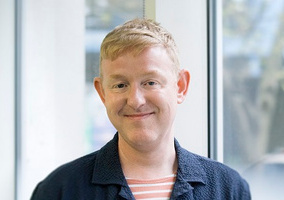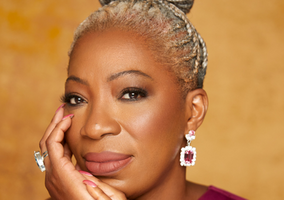Charities involved in political campaigning should include people with lived experience, a charity leader has said.
Speaking yesterday at Charity Finance Group’s (CFG) annual conference, Tessy Ojo, chief executive of the Diana Award, told delegates that charities that run campaigns want to become “the saviour” and tend to “take over” stories that are not theirs.
Ojo was speaking alongside Chris Sherwood, chief executive of the RSPCA, on the cost of culture wars on charities’ missions and how the sector can navigate society’s divides while staying true to their purpose.
People with lived experience must tell their stories
Asked by chair Clare Mills, CFG’s director of policy and communications, how charities can run “potentially controversial campaigns” while considering reputational and financial risks and staying true to their mission, Ojo said “we need to understand why you are telling a story”.
“What is the campaign? What battle in that sense [do] you want? What are you trying to raise awareness of and who is telling the story?” she said.
Ojo gave the example of Freedom From Torture’s #StopTheFlights campaign which won the Overall Award for Excellence at this year’s Charity Awards.
She said there was “such clarity in the message” and that the success of the campaign was because it was led by people with lived experience.
“They allowed the people with lived experience to own that campaign. Some of the problems that we have is that we take over a story when it’s not our story. We really need to allow those who have the story, those who own the story, to lead that story. Because if you listened to that campaign, if you saw the campaign, everyone who was involved had come into this country at one point or the other and they led the campaign purely by telling their story.
“What they did was super clever because they didn’t choose to go to government because they knew what would happen with culture wars. They went to the four airlines that had signed up to be the carrier and they told their story. They went to their head office and one after the other, each airline understood the stories of these people because what you hear in the media is that every refugee is evil, every refugee is an economic migrant, but they turned that narrative around.”
She added: “The beautiful thing about that campaign was that it was completely led by those with lived experience. I think that a lot of the mistakes we make as a sector is that […] we take over, we want to sometimes become the saviour because we have this amazing intellect of how we’re going to run campaigns. And actually, that’s not how to do a campaign.”
Stay true to your purpose
Citing Ronald Reagan’s saying (“if you’re explaining, you’re losing”), Mills asked Sherwood whether “it’s the same for charities” or if they get “an easier ride because we’re the good people”.
He answered: “I don’t think we get an easier ride because we’re charities, I think those good days have long gone. And I also think that whilst we can’t be party political, we absolutely can be political, with a small P.”
He added: “First of all, stay true to your purpose and what you’re about, even when it’s tough. I think you have to be bold and more creative in finding ways to get your message across to the public. Secondly, you have to continue to push on this as well and use different tools at your disposal because it’s what we’re about. This is the story of charity: a group of people come together who spot a social issue, a poorly met need, an unmet need in society and say: ‘It’s not right and it has to change, we can do something about it’, and they do that through service provision and campaigning.”
“We don’t just sit there and take the punches, we go into battle on behalf of our beneficiaries, our voice is so important. And it’s not just about showing the value of what we do, it shows the value of what we do as a sector because the UK has a massive asset in the charity sector. Unlike other jurisdictions, we provide huge amounts of contribution to create what I want to see, which is a good society. One which is fairer, more equal, kinder, more compassionate.
“[…] That’s why it's important that we do speak out but when some of our colleagues in the sector criticise, we come out and support them as well, we stand together because it’s not an attack on that charity, it’s an attack on our right as a sector to advocate on behalf of our beneficiaries, even when people in power don’t like it.”
‘Increasingly polarised times’
Asked how charities can navigate society’s divides such as Brexit, Sherwood said: “We’re living through increasingly polarised times. It’s pretty difficult out there, we’ve seen many fantastic charities being attacked in the public sphere for taking a stand on issues which are absolutely directly relevant to their core purpose and their beneficiaries.
“That’s difficult, that polarisation, and it’s going to get worse before it gets better in the run-up to a general election, with the potential change of government.”
He gave the example of trans people becoming a “political football” in the culture wars.
“At the end of the day, what we have to focus on as charities is that we’re not talking about abstract issues, we’re talking about real people’s lives. We have a really important role, whether that’s about animal welfare, trans inclusion, mental health, climate change, to keep telling those stories and stay true to our purpose, and advocate on behalf of our beneficiaries.”
Related articles











